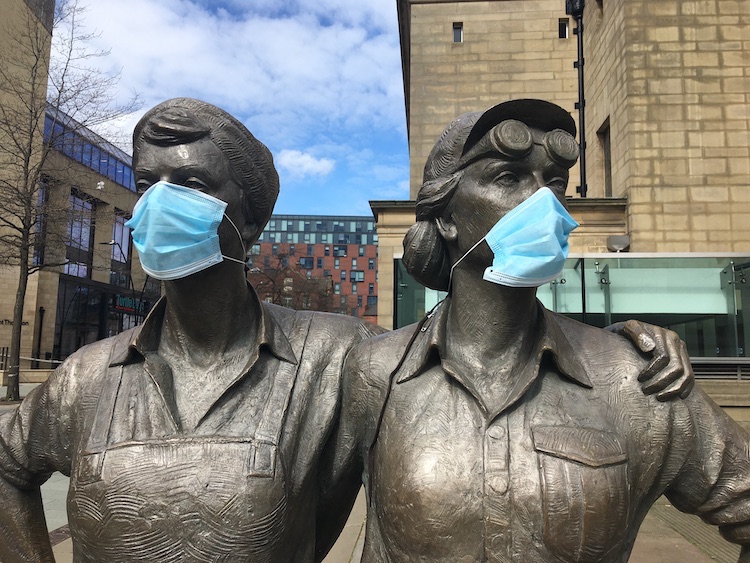
A reward for resilience
– from Julian Dobson, Sheffield, 19.05.2020
My weekend run usually takes me west from my home, away from suburban Sheffield to the moorland that gives rise to the city’s tumbling streams and widening rivers. It is good to get away from the diesel fumes and onto the hills. But on this occasion I head through the city centre and east, the absence of traffic offering a chance to run on terrain usually reserved for shoppers. Occasional dog walkers cross the road to avoid each other. In the city centre itself the shops are shuttered, the theatre closed, the cafe doors bolted. Outside a grocery store a cluster of homeless people sit with their beer cans.
Barker’s Pool is the city’s gathering place. It is where veterans gather at the war memorial, and where protesters and trade unionists rally after their marches. It is a space of festivals and university graduations. It is silent. But the Women of Steel still stand beside the City Hall.
The Women of Steel is a bronze sculpture commemorating the women who worked in Sheffield’s factories and furnaces during the world wars, surviving bombings and producing armaments. It is popularly seen as a symbol of resilience and fortitude. Today the women are masked in blue medical face coverings, as if they are healthcare workers. In a city that has experienced one of the highest rates of Covid-19 infection in England, it is a reminder that many are making extraordinary sacrifices for the public good.
But there is another, more hidden, story of landscape and public spaces. The rivers that fall from the west were the cradle of Sheffield’s industry and fed the factories where the women of steel laboured. Since the 1980s capital has flowed from production to consumption, its new citadel the former factory of Meadowhall. Today the consumption economy has juddered to a halt. Instead, cautiously, people venture into the city’s green spaces for their permitted exercise, discovering other values and connections.
This is a city of hills and views, of watercourses and rocky edges, long linear parks in wooded valleys. In the weeks since the government imposed a lockdown on all but essential work and travel, many Sheffielders have rediscovered, or appreciated for the first time, this abundance of natural spaces. As the coronavirus crisis has unfolded, so has a spring of unprecedented sunshine. We have watched the city turn green, and for the first time been able to fully hear its birds and smell its trees and flowers.
Just as these natural spaces once hid mineral resources that made Sheffield wealthy, so today they reveal resources to keep the city sane and healthy. We have had a brief glimpse of how we might live, measuring progress by the quality of our landscape and our ability to connect with the more-than-human world. It may not be what today’s masked women of steel are fighting for, but it’s the least they deserve.
POST(COVID)CARDS
